
OK, here’s the thing: If you’re looking for a proper, respectful, stiff-backed novels-for-illiterate approach, just save yourself getting worked up and don’t go see this. It’s that simple. If you’re expecting and wanting Moulin Gatsby!, get to a theater with all possible haste. Now, I don’t really give a damn about Fitzgerald’s book. I’m not even all that wild about it, and I’m really too old to care about the all the sputtering and stuttering of the “B…b..b..but it’s a literary m..m..masterp…piece” brigade. And yet, I think Luhrmann’s film captures the essence of the book in ways no other version has while giving us Luhrmann’s brilliant imagining of what it must have been like and how he sees and responds to the story. Unlike every other extant version of the film (the original 1926 one is lost, but the existing trailer looks extremely proper and dull), Luhrmann’s film captures an authentic sense of the desperation that lies beneath the book and the entire Jazz Age.
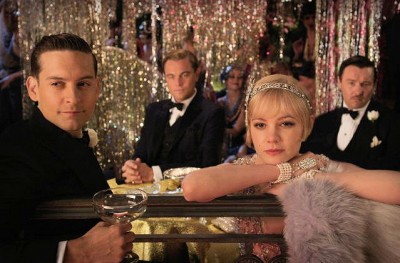
By the way, I did not use the bogus title Moulin Gatsby! lightly. Having just seen Moulin Rouge!, it’s very fresh in my mind and Gatsby really does follow that template — right down to the way it opens and closes — both physically and dramatically. In giving the film a structure that presents Nick Carraway (here he’s essentially Fitzgerald) as an alcoholic going through a stint in a sanitarium, who is encouraged to write the story as therapy, it adopts very much the same overall structure as Moulin Rouge! with Christian telling the story of the dead Satine. Here it simply becomes Nick (Tobey Maguire) telling the story of Gatsby (Leonardo DiCaprio). That, of course, makes Nick’s relationship with Gatsby a kind of romance in itself — and there’s little doubt that Luhrmann has taken Nick’s idolizing Gatsby to, at the very least, the level of a man-crush. You can take that further if you wish but, by the end, the only person we’re sure ever actually loved Gatsby in any sense is Nick. As a result, you can look at the whole thing as the love story of the two men (read that as going into the frighten-the-horses territory if you like) — regardless of the fact that it’s clearly not consummated. After all, the unconsummated loves are often the hardest to get past, which would explain why Nick is so haunted by Gatsby.
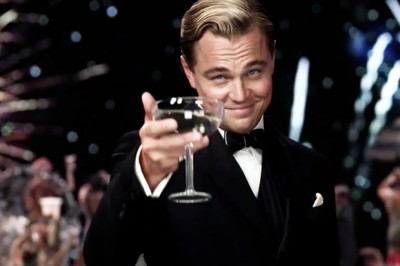
I suspect that further viewings of the film will reveal that the structures of the two movies have even more similarity — starting with the first party here being the equivalent of the first trip to the Moulin Rouge. That first party may, in fact, outdo Moulin Rouge! in sheer spectacle while still using that spectacle as an event leading to our first look at a character who has been built up for some time. I didn’t time it — I was too immersed in the film for that — but I wouldn’t be surprised if 20 minutes of the film had passed before we ever see Gatsby, who finally arrives in a shower of fireworks and Gershwin’s “Rhapsody in Blue.” If ever any movie gave us such an overwhelming figure of sophistication, self-assurance and romance as this Gatsby on first look, I can’t conjure it to mind. But this is only one projection of Gatsby — a character who is many things throughout the course of the film.
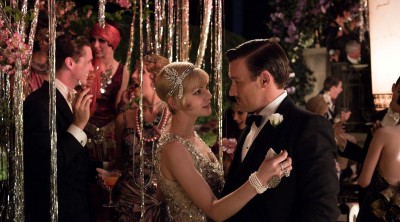
Being that this is a Baz Luhrmann film, it is, of course, heavily about its style. But like Luhrmann’s most obvious predecessor, Ken Russell (Luhrman seems to have taken on Russell’s ability to polarize audiences and critics, too), the style is part of the vision — part of the way in which the filmmaker is expressing his own take on and reaction to the material. In this case, what we’re getting is Luhrmann’s fever dream of the 1920s in his own terms — and those terms include the surprisingly effective and not really obtrusive use of music that’s not of the period. (If you’re in the avant-garde — like Derek Jarman’s 1979 film of The Tempest with Elisabeth Welch popping up to sing “Stormy Weather” — this sort of thing is praised as brilliant, but that doesn’t seem to work in the mainstream.) The characters are defined by their settings and by the fluidity of Luhrmann’s vision, evoking the grandeur that threatens to swallow them at every turn (especially in the effective use of 3-D). Everything is just a little too much, a little too big and a little too overwhelming — just like the emotions that drive the characters. And, unlike the 1974 film adaption of the story, the characters in this film do not exist in a weird vacuum. This Gatsby is — as he would have to have been — fodder for the media.
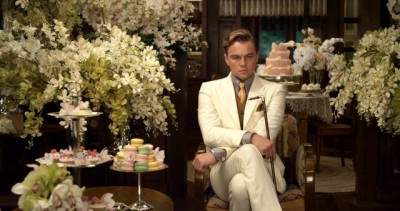
The amazing thing, though, is that within this fever-dream fantasia, Luhrmann has found the humanity of his characters in ways no previous film version of the book has done — no matter what illusion of literary fealty they generated (actually, only the 1974 film really tried). His Gatsby —like his film — is alive. He dreams. He feels. He’s an incredible mixture of bravado, bullshit, idealism, childlike naïveté — and in some instances, childish petulance. Fortunately, in DiCaprio he has an actor capable of conveying that range. For that matter, the depths of Nick Carraway are surprising here. Even more surprising to me is that this is carried off by Toby Maguire, an actor I don’t usually care for. Here, he seems just right — and inexpressibly sad.
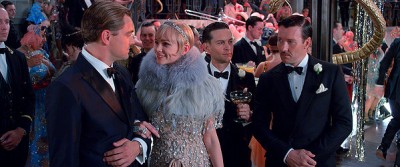
All in all, Luhrmann’s film does right by the book. Yes, I know there are all sorts of claims of how it “ruins” the book — which is ridiculous anyway, since the book is still there — but I’m not buying that point of view. I think this is simply brilliant filmmaking that takes its place on something like even footing with the story. The story is largely all there — only enhanced by the immediacy of Luhrmann’s filmmaking. In the end, Luhrmann’s film has done something I didn’t think possible: It’s made me actually like the book a lot more. Rated PG-13 for some violent images, sexual content, smoking, partying and brief language.
Playing at Carmike 10, Carolina Cinemas, Epic of Hendersonville, Regal Biltmore Grande



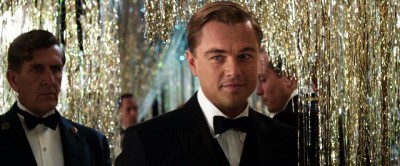
The only real apprehension I had going into this was that Toby McGuire would wear on me. Not only did he not piss me off, but I agree that he was right on the mark.
I thought DiCaprio was excellent, and Edgerton too. Debicki actually did more for me as Jordan than Carey Mulligan did as Daisy. Not sure why her performance never amounted to anything special for me…
Have you watched this in 2D yet? I left not feeling strongly one way or another about the use of 3D.
I don’t explicitly disagree with much of anything you’ve said, but I thought the film lost a bit of steam by the end. Most of what followed the heated exchange at the Plaza Hotel didn’t seem to pack as much effect on me as I hoped/expected.
Oh, you’re back from playing nimrod…except you didn’t, but I’m left with the feeling that canoes were involved.
Debicki actually did more for me as Jordan than Carey Mulligan did as Daisy. Not sure why her performance never amounted to anything special for me…
Debicki is an excellent Jordan, but she’d be a lousy Daisy. Daisy is, I think, an impossible role for anyone. (Although if you watch Mia Farrow in the ’74 film, Mulligan is positively scintillating by comparison.) You almost have to be Gatsby to get it — and DiCaprio is good enough at conveying his fixation that I was satisfied.
Have you watched this in 2D yet? I left not feeling strongly one way or another about the use of 3D.
I really wanted to catch it in 2D while it was in the big theater, but, of course, I didn’t get around to it. I liked the 3D a lot. I thought it enhanced the unreality of the world these characters inhabited, but I’m assuming that — like Hugo — it will survive being seen flat just fine.
Most of what followed the heated exchange at the Plaza Hotel didn’t seem to pack as much effect on me as I hoped/expected.
I was actually expecting it to bog down and, for me, it didn’t. I think that’s mostly due to Nick and the use of the green light. I wonder if it will work better for you on a second viewing when you know what to expect.
I have wondered what you think when Peter Travers matches your overall review of a movie like Iron Man and then goes and crushes Gatsby. Your styles have a similar appeal and I always enjoy when you are polar opposites.
That’s a tricky question because I rarely read Travers. I vaguely knew he didn’t like Gatsby, but I had no idea about Iron Man 3. I don’t really worry very much about what other critics — even those I might line up — think about a film, because there are certain types of films that some people just aren’t wired to respond well to. It just varies from person to person. I’m not wired to like slow moving, grim, (to me) nihilistic movies like Amour, but it doesn’t bother me that a lot of critics did. I certainly don’t question my take on Gatsby because it doesn’t line up with Travers’ take. I am more apt to puzzle over reviews by people I know personally — and I don’t know Travers.
For me, Gatsby is the only big picture I see coming along this summer that is for people who don’t really care about explosions and super heroes and things in that general range. I also think that’s why it’s done better than anyone predicted.
Well, George RR Martin liked it: http://grrm.livejournal.com/324330.html
For Ken’s benefit, he’s the guy who wrote Game of Thrones.
I hope that’s not meant to impress me.
Before
your aversion to mix CDs
More like an aversion to lengthy mix CDs. The sweet spot is around ten to fourteen songs around the fifty minute mark, But if you’re going to fill the whole eighty minutes, I’m exhausted around the hour mark, and losing focus in the music. This is just how I digest music new to me and prefer the ten to fourteen song serving. This extends to listening to regular albums. I’m still trying to fully digest “Exile on Main Street.”
Also, don’t you owe me a third mix CD?
I think the shirt scene — like several others — is supposed to be a little creepy, because you catch on to the fact that Gatsby will always be trying too hard and ultimately be smothering.
I like this interpretation.
Is that second sentence missing a “not?” I have the feeling in context that you meant “and not just a fashionable and entertaining movie.”
Yes. I need to hire an editor.
I’ve been writing and working with these thoughts for the last couple of days, and I still feel like my comments are incomplete. I should mention that the movie has slowly been growing on me, and I’m sure after a second viewing that there is strong potential I could really like it. I am after all, very fond of the book, and think this is an excellent adaptation.
Good. Perhaps you’ll one day understand that Moulin Rouge! is a great film — not a “mixed bag,” but a fusion of elements. (I wish you’d come to the big screen showing, because even if you saw it on the big screen in 2001, you were how old?) We’ll see.
(14). We will see, I’m not ruling out that chance.
“Yes, I know there are all sorts of claims of how it “ruins” the book..”
Told ya, told ya, told ya……!!
But I never read the damn thing, so I went in clean, and I LOVED it! Even the hip-hop/R&B/jazz fusion went over well. Again, you win Universe!
I generally see DiCaprio playing a character and think he’s just playing himself (although he surpised me a little in “The Aviator”), but here he really turned it around on me. I even bought the uber-repetative “old sport”, once I came to realize that this more more a Gatsby pretention than a DiCaprio one.
The worst thing I can say about this film (and is a strain to even mention this) is that by the end, I thought it MIGHT have overdone the green light/musical note cue (I was afraid I might wake up in the middle of the night hearing that damn thing) but the film ended before it reached that particular threshhold.
And despite the 2 hour-plus run-time, the pace kept it out of mind as well. That is now the foundation of my meager film criticism: was the film well-made enough to make me and my posterior forget it was as long as “Place Beyond the Pines”, which still hurts to think about.
More like an aversion to lengthy mix CDs. The sweet spot is around ten to fourteen songs around the fifty minute mark, But if you’re going to fill the whole eighty minutes, I’m exhausted around the hour mark, and losing focus in the music.
Sounds like an attention span problem, but regardless, couldn’t you — oh, I don’t know — stop after the 10th song and go back later and start with 11?
Also, don’t you owe me a third mix CD?
In the first place, I don’t know at this point what was on the earlier ones. In the second place, how often do I see you these days?
I’ve been writing and working with these thoughts for the last couple of days, and I still feel like my comments are incomplete.
In one way or another, that should always be true of any film of substance or complexity.
We will see, I’m not ruling out that chance.
I bide my time.
Yes, I know there are all sorts of claims of how it “ruins” the book..”
Told ya, told ya, told ya……!!
It’s not like I didn’t expect it. I’ve yet to see the adaptation of anything that didn’t piss somebody off.
Well, George RR Martin liked it
That man needs to stop watching movies, and finish his series, no matter how disappointing it will turn out.
Sounds like an attention span problem
Or maybe my ears need a break.
In the first place, I don’t know at this point what was on the earlier ones. In the second place, how often do I see you these days?
I remember on the first half of the first CD, it was T-Rex and E.L.O that really stood out for me. There was this game of course of how much of a musical education I needed by naming the bands on the mix CDs, and it was pretty dire because I couldn’t name anybody.
I’m still up for that education.
Or maybe my ears need a break.
Ear attention disorder.
There was this game of course of how much of a musical education I needed by naming the bands on the mix CDs, and it was pretty dire because I couldn’t name anybody.
This is because you’ve frittered away your time.
I’m still up for that education.
You figure out how to work it out.
“I’ve yet to see the adaptation of anything that didn’t piss somebody off.”
But a canonical work like “Gatsby” will surely draw mountains more ire than say “Cold Mountain” or “Hunt for Red October” (both excellent adaptations IMHO).
Probably, but it’s also more likely that the critics have read it.
Then again, it’d be hard not to improve on the book Cold Mountain. (I admit I lost patience with the book about a third of the way through.)
Just last night Frazier’s book came up on I was admonished for putting it down half-read 12 years ago. They nearly had me convinced that I needed to pick it back up off my shelf.
Don’t let me stop you!
I like the book and movie of Cold Mountain, plus Frazier’s other two novels.
I think that’s allowed, but I’ll have to check the rules.
And here I thought I was breaking rules…
You must try harder. Be a cut above.
“…it’d be hard not to improve on the book Cold Mountain. (I admit I lost patience with the book about a third of the way through.)”
“I like the book and movie of Cold Mountain, plus Frazier’s other two novels.”
“Cold Mountain”, with its’ heavily regional dialect, is definately an acquired taste and not for everyone. “Thirteen Moons” was OK, but not half as good. I haven’t read the latest and am in no hurry to, as contemporary mountain novels don’t sway me as much as historical ones, but since Robert Morgan’s contemporary work is pretty darn good, I guess I will have to break down and try Frazier’s. And my bookshelf is (finally!) showing a little space for some additions.
I don’t always agree with Ken’s general estimation of films (usually I do), but this one seems spot on to me. The vilification of the flick by so many “Tomatoes”
critics seems to me to me at times to be little but self-indulgent blather (as I age, it becomes easier for me to discern when a critic is more interested in his/her own writing than the film at hand).
This review seems to me to be a reasonable obeisance to a truly interesting version of “Gatsby”. Hanke reminds us that the writer(s) of a screenplay and its director are not “doing the book” so to speak. They are using a great book (disagreement with KH here — taught it over 50 times) to create a film that is inspired by the book. Now, as KH reminds us, we don’t want to see too much self-indulgence, too much poetic license (the “Stormy Weather” for “The Tempest” is laugh-out-loud outre, indeed)
The “choreography” for the opening party bothered me not one iota. I call that kind of thing an embellishment. It’s not intended to deceive or outdo the book. It’s intention is to make us smile.
The death of Gatsby is a bit hokey. In the book he is on a float and is plugged by “a figure” materializing out of the darkness. Here we must endure a Hollywood groaner of protracted death. Boo.
I wish more writers would have dealt with the end in detail: “And so we beat on, boats against the current. . . etc, etc”. What’s he after here? To me it’s really central but to the makers of this film, apparently not so. To readers: try drawing the metaphor. See if or how it works.
“…self-indulgent blather…”
I love that! Nothing warms my heart more than seeing pins stuck into puffed-up pseudo-intellectuals. Probably why I admire Cranky Ken’s style of criticism, very everyman/blue collar. the “Howard the Duck” of cinematology.
“…a great book (disagreement with KH here — taught it over 50 times…”
Mr. Voorhees, please offer an opinion as to why you think this book only sold 20,000 copies before Fitzgerald’s death, but became canonized so much later. While I am no fan of “classic” American literature (i.e the stuff teachers forced on us in high school), I do not ask this merely to be arguementative, but as you are the first person on this forum who has an inside track on the history of the work. Also, what do you think of the current fad of memorializing Zelda Fitzgerlad, with TWO novels about her being promoted? Is there anything more than riding the coat-tails of this film?
I love that! Nothing warms my heart more than seeing pins stuck into puffed-up pseudo-intellectuals.
You realize that probably about half those negative reviews call the film “self-indulgent,” which makes the use of it against them all the better.
Probably why I admire Cranky Ken’s style of criticism, very everyman/blue collar.
I have been called many things, but never that.
the “Howard the Duck” of cinematology.
And certainly never that.
And, Bob, I didn’t say Gatsby wasn’t a great book, I said I wasn’t that wild about it.
For “Big Al” — Al, I don’t know much (really,nothing at all) about Zelda; the subject doesn’t interest me, so I have to pass on that one. Regarding the sale of “Gatsby” –good question. It does seem to me that book sales often have little to do with book quality. Great books are often passed from publisher to publisher (sometimes, dozens of times) before someone nibbles. On the other hand, you have people like James Patterson, who sells millions of books every ten minutes. Go figure. I once tried to “edit” a book by John Grisham. I found astonishing errors, errors most high school teachers (I was one) would flag in a heartbeat. Sometimes I think that writers like Grisham (and I LIKE to read his books) want to get them out so fast that they either don’t give a damn about the quality of the writing – or maybe just give them to Mom to edit.
But I think that this is a truly great novel: the first five pages are worth the price, and a life philosophy could have them at its center. Much of what’s truly rewarding in “Gatsby” seems to me to require discussion. How is this portraying “the American Dream”? How does it subvert the “Dream”? Why does Fitz try to pull us all in at the end (“and so WE beat on, boats against the current. . .”) What about the green light? What about the “great green breast of America”? I could go on (Why does Jay Gatsby remind me so much of Joe Kennedy? And what in the hell was Leo trying to do with that accent? And: Isn’t the last line one of the great ones in all of American literature? How does it relate to the book? To Nick?To us? What’s it mean? (I’m out of breath)
And by tomorrow, this’ll be gone.